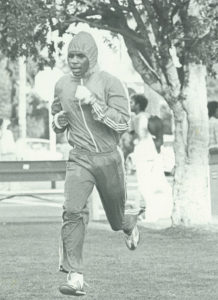Ringside Report Remembers Boxer Davey Lee Armstrong (1956-2021)
[AdSense-A]
 By Donald “Braveheart” Stewart
By Donald “Braveheart” Stewart
Davey Lee Armstrong, 24-3, 14 KO’s. From where is sit, it sounds like a cavalier cowboy who has gone west to tame the outlaws, but it is really a Washington native, who ahs lost his final battle but is well remembered as a man of great modesty.
Armstrong was a gifted boxer, who was able to change from orthodox to southpaw with ease. Often this would outfox his opponents, but this was not the only reason he won so many titles in the amateurs. He just also happened to be one of the most able boxers produced in the amateurs of the 1970’s. it was his combinations as well as that bamboozling ability to switch that made him an effective boxer.
Armstrong was brought up in the amateur ranks alongside three world champions, and two Olympic champions so it comes as absolutely no surprise that he represented the USA at the 1972 and 1976 Summer Olympics. Unfortunately, he did not get passed the second round in 1972, losing to the bronze medalist but an Olympic pedigree is an Olympic pedigree. Four years later, at Montreal he returned and got as far as the quarter finals this time.
Speaking about the Olympics sometime later in an interview he was to reflect, “I got beat in my second fight at Munich and lost a bronze medal. I figure I owe it to the United States to go back and get a medal this year. I didn’t put out as much as I should have four- years ago. I had a problem of being overweight, and it took me four times to make my weight. A German woman at the house where my coach was staying kept feeding me cookies. I ate too many. I think she was trying to get me fat. I’m a lot smarter now. I’m now setting up my man instead of wearing him down.”
The road to 1976 was nearly lost to him two years earlier when he was in a car accident in Northern California when the camper van in which he was travelling flipped over leaving him with third degree burns on his right foot. Following skin grafts this healed and despite losing months of training he was till able to continue his incredible boxing journey.
That team in 1976 was reckoned to be one of the best – names that represented the USA included Clint Jackson, Sugar Ray Leonard, Howard Davis, JR., Charles Mooney, Michael and Leon Spinks.
It was to be his second Olympics and a repeat of his first in terms of medals as he returned without one. He was incredibly disappointed at the end because he fought in the quarter finals and won – according to him AND many at ringside. The result was not lost on him and in that same interview, Armstrong said, “This is my second time around in the Olympics and this is the second time they said I lost. I know I won it this time. I gave it everything I had in the third round. I just don’t understand it. The Cuban was strong, but he had no skills, and he held a lot. He was just swinging wild ones.”
Surely if he was that good, then his next Olympic challenge would bring that medal. On the road to the 1980 Olympic Games Armstrong was again one of the outstanding names in the amateur ranks. In 1979, the Soviet Union invaded Afghanistan leading President Jimmy Carter to stop the USA being represented at the Games. Armstrong was to be denied once more.
Three Olympic Games would have been a terrific record but it was not to be and the professional ranks beckoned. It followed a career in the amateurs that was the epitome of sterling and impressive: five-time National AAU finalist and four-time champion and 170 wins with 24 defeats. Things ought to have looked rosy.
Of course, once you go from being an amateur to a professional any medal or experience you gained in the amateurs works only so far to get you inside the ropes, once inside none of that is going to protect you!
28th March 1980, the amateurs behind him, this was the time for him to turn to the professional ranks. Detroit, the Kronk Gym, was his place of study but despite the achievements in the amateur ranks Armstrong did not quite manage to scale the heights professionally he had managed in the unpaid game. He had twenty seven professional fights with twenty four wins over a three year period and this was never going to set the same heather alight as he had managed in the amateur ranks.
His debut was in Tacoma against Gill Hernandez which he won on points over 6 rounds and his only challenge for a title came for the NABF lightweight title on the 9th June 1983, against Nicky Furlano which he lost on points over 12. His next fight was his last – a loss against Steve Romero where he hit the canvass in the first and lost over ten rounds.
Armstrong gave up boxing and went to work for the city as a bookkeeper before he died this year, in this month, February.
He reminds us that not just the bright lights and big stars are the cornerstone of the sport but it has a heart in the unpaid ranks that gives the excitement and the joy which springs us up to the ringside again and again to see the hard work and dedication of years tested in a square ring is to be valued, treasured and admired all the time.
[si-contact-form form=’2′]

